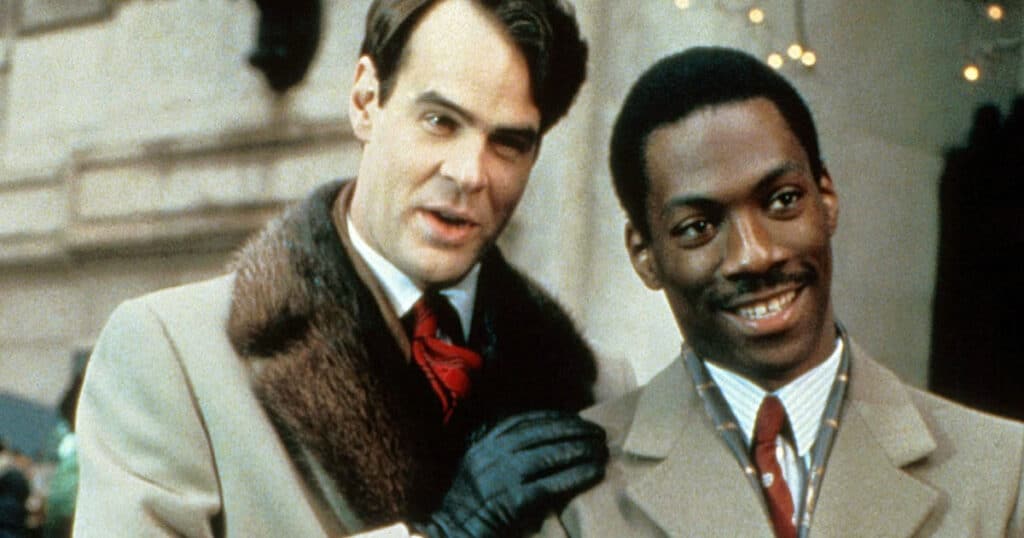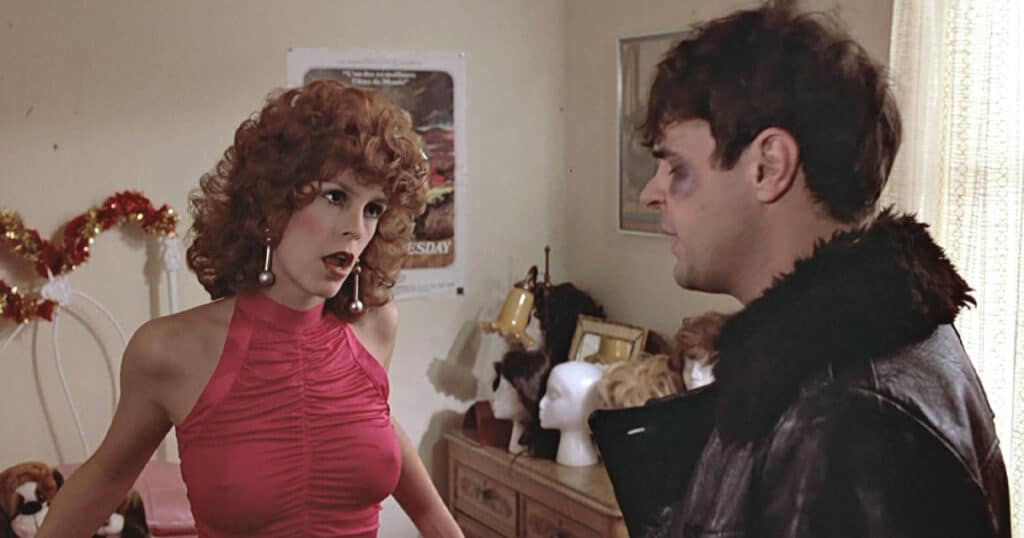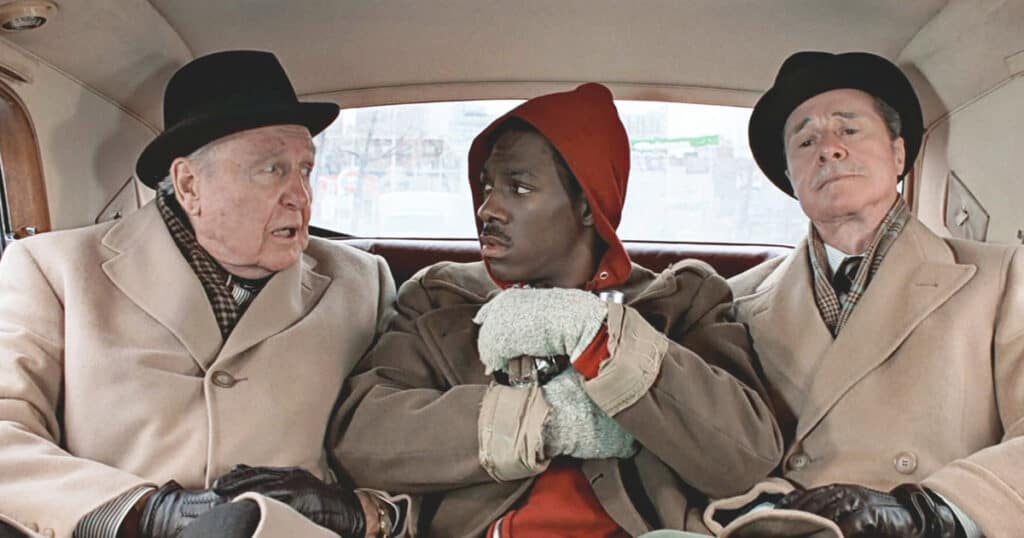Trading Places remains a highlight in the careers of stars Dan Aykroyd, Eddie Murphy and Jamie Lee Curtis. A riff on the timeless Prince and the Pauper tale, it was a smash hit in the summer of 1983, ranking fourth for the year, only beaten by Return of the Jedi, Terms of Endearment and Flashdance. It became a staple of video stores and cable and is also an unheralded holiday classic, taking place around Christmas and New Year’s.
Flashback to 1982. This was an important year in the lives of all of the leading players involved with Trading Places. For star Dan Aykroyd, it was marked with tragedy, with his best friend and frequent on-screen partner, John Belushi, dying of a drug overdose early in the year. Likewise, director John Landis was involved in a tragedy while directing Twilight Zone: The Movie. While staging a scene involving a helicopter, star Vic Morrow and two child actors were decapitated in a scandalous incident we explored in detail in our episode of WTF Happened to This Movie on Twilight Zone. It would result in years of legal action, with Landis’s reputation taking a severe beating when it was revealed that the two child actors were hired illegally and should have never been on set. It would take some time, but eventually, the incident would leave Landis’ career in tatters. Forty years later, it still casts a large shadow over his legacy. Curiously in its immediate aftermath, he would have two of his biggest successes ever – the music video for Michael Jackson’s Thriller and, of course, Trading Places.
By contrast, 1982 was a fantastic year for Eddie Murphy. He was a core member of the second generation of Saturday Night Live stars. While fans and critics mostly reviled them, Murphy was considered a diamond in the rough, and people would watch the show every week to see how brilliant he was. Hollywood came a calling when he was cast opposite Nick Nolte in the cop action comedy 48 Hrs as a smart-mouthed con named Reggie Hammond. Nick Nolte and director Walter Hill no doubt sensed Murphy was a force to be reckoned with, and they let him dominate the movie, with him having all of the best scenes. By the time Murphy, as Reggie, walks into a cowboy bar (which seems an odd fit for downtown San Francisco) and starts bossing folks around, a star had been born, with the movie making over $78 million at the box office, ranking seventh place for the year. Murphy was so hot that when Nick Nolte had to bail on hosting SNL, they elevated Murphy to host status, with him holding a record as the only person ever to host an episode of the show while still a cast member.
Meanwhile, Jamie Lee Curtis was at an important crossroads in her career. For the first time, a Halloween movie had been made without her, Halloween: Season of the Witch, and she seemed ready to move on from the scream queen status that had begun to define her, with movies like Terror Train, Prom Night and Road Games playing to diminishing returns. She received some critical acclaim for playing murdered playmate Dorothy Stratten in the TV film, Death of a Centrefold, but her big screen career was dead in the water.

So, when Trading Places went into production in the 1982 Christmas season, it was not a sure- thing, although all involved had to be thrilled when 48 Hrs opened only days before filming began to boffo box office. None of the cast members were the original choices, with Trading Places intended as a star vehicle for Gene Wilder and Richard Pryor. Neither was available, so the film, which was initially titled Black & White and was written by Timothy Harris and Herschel Weingrod, ended up in the hands of Landis, who said the premise reminded him of classic 1930s screwball comedies.
Paramount Pictures had begun testing 48 Hrs by this point and knew that Murphy was lightning in a bottle, so he was floated as a replacement for Pryor, which Landis went along with – but he wanted Dan Aykroyd to co-star. While the two had made The Blues Brothers together, the studio assumed his career would crash and burn, as he was considered a straight man to Belushi at the time and little more. Indeed, his first film as a solo star, Doctor Detroit, would bomb just a few months before Trading Places came out, and it was only after taking a significant pay cut that Aykroyd got the role. Jamie Lee Curtis would take the most significant pay cut of all, as the studio balked at casting a “scream queen” as the leading lady. Luckily, she had a keen supporter in John Landis, but in the end, she’d earn a mere $70,000 for a role she would have to get naked in, which is ludicrous, but would pay off in the end.
The rest of the cast would be filled out by an intriguing mix of character actors. The defacto fourth lead in the film is the Aykroyd character’s butler, played by the late Denholm Elliot. A well-respected British actor, he was brilliantly cast after having played Marcus Brody in Raiders of the Lost Ark. His character, Coleman, would be the movie’s conscience. In the film, Aykroyd’s Mortimer Winthorpe III is a wealthy commodities broker who finds himself the target of a cruel joke by his benefactors, the villainous Duke Brothers. They believe they can elevate anyone off the street to Winthorpe’s position while simultaneously destroying the man himself instantly. Overnight, Winthorpe becomes a criminal, only saved by the classic hooker with a heart of gold, Curtis’ Ophelia, while Murphy’s Billy Ray Valentine, a homeless con man, gets Winthorpe’s prestige and money.

Elliot’s Coleman knows how cruel the joke is and starts to bristle when he gets to like Murphy’s essentially kind Billy Ray. When Murphy’s character himself gets wind of what’s happening, he sets the wheels in motion to team with Winthorpe and get even, with Coleman playing an essential role in their scheme.
The evil Duke Brothers are the most inspired bit of casting. Landis maintained that 1930s screwball comedies inspired the film, so to play the villains, he got two legit screwball legends to star. One of them was Ralph Bellamy, who always played a character dubbed “The Baxter” in the famous Michael Showalter movie. He was always the guy who didn’t get the girl and went on to a long career in front of the camera. The same year he starred in Trading Places, he was nominated for an Emmy for playing FDR in The Winds of War. The other Duke Brother was more of a “find,” with Don Ameche, a former contract star for Fox, having quit acting and living modestly. He had to be coaxed back into acting and was very uncomfortable with some of the dialogue, with his character using the N-word at one point and saying f*ck in the climax. Despite his reservations, the role led to a monster comeback for Ameche, who would win an Oscar two years later for Cocoon and work steadily up to his death. Ironically, in his old age he was arguably a bigger star than he ever had been as a young man, and this was the film he owed it to.
Landis also filled the movie with younger, more contemporary comics, including Paul Gleeson as the bad guy Clarence Weeks, after Watergate Fixer G. Gordon Liddy turned it down when he found out his character would – as Wikipedia so tenderly puts it – winds up as the romantic partner of a gorilla. Also, keep your eyes peeled for young John Belushi, Al Franken and Tom Davis.
Landis also made an inspired choice for the soundtrack, hiring Elmer Bernstein, long regarded as one of the best dramatic composers in Hollywood, famous for his work on The Magnificent Seven, to score. Bernstein was a hot commodity as far as scoring comedies went at the time, with him famously doing the soundtrack to Ghostbusters the following year.
As it turns out, the movie was a smash beyond the expectations of the studio, Paramount Pictures. Ranking fourth for the year, it proved 48 hrs was no fluke and solidified Eddie Murphy as the hottest comedy star of the eighties. The following year he would make Beverly Hills Cop. Dan Aykroyd also proved he could carry a movie and went on to do Ghostbusters next, so in essence, the two stars of this movie also had the two top-grossing films of 1984 between them. Sadly, this would be their only on-screen team-up.

Murphy would, however, reunite with John Landis for two more movies. The first reunion, Coming to America, would become one of Eddie Murphy’s biggest hits and even feature a cameo by Ralph Bellamy and Don Ameche as the Duke Brothers, who’ve been left homeless following Trading Places but get left a bag full of cash by Prince Akeem. Their next collaboration, Beverly Hills Cop 3 – well, if you don’t have anything nice to say, don’t say anything at all (check out our recent WTF episode on it).
By contrast, Jamie Lee Curtis would be elevated to sex symbol status thanks to her role here, although it would take until 1988’s A Fish Called Wanda before she would get kudos as a comedienne in her own right. When Aykroyd and Murphy’s careers would falter in the nineties, Curtis would become bigger than ever – first by teaming again with Aykroyd for My Girl and the sequel, My Girl 2, and then by teaming up with Arnold Schwarzenegger on True Lies. Sadly, Denholm Elliot would die of AIDS in 1992, but not before delivering another solid comedic performance in the underrated Peter Bogdanovich movie Noises Off.
Indeed, Trading Places would remain a highlight of the careers of all involved, even if the film has met with a little controversy over some aspects of the film. It remains hilarious, and it’s worth noting that Murphy’s always looked back at it fondly, calling it the best time he ever had making a movie.


















Follow the JOBLO MOVIE NETWORK
Follow us on YOUTUBE
Follow ARROW IN THE HEAD
Follow AITH on YOUTUBE